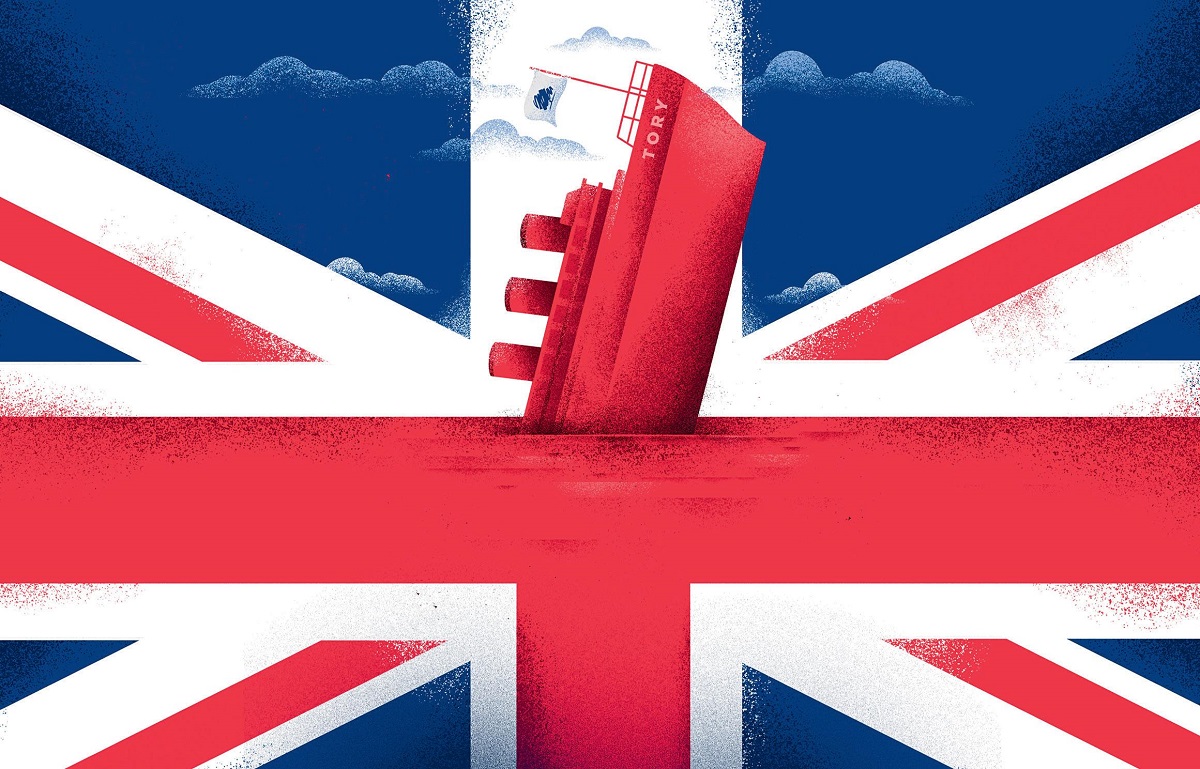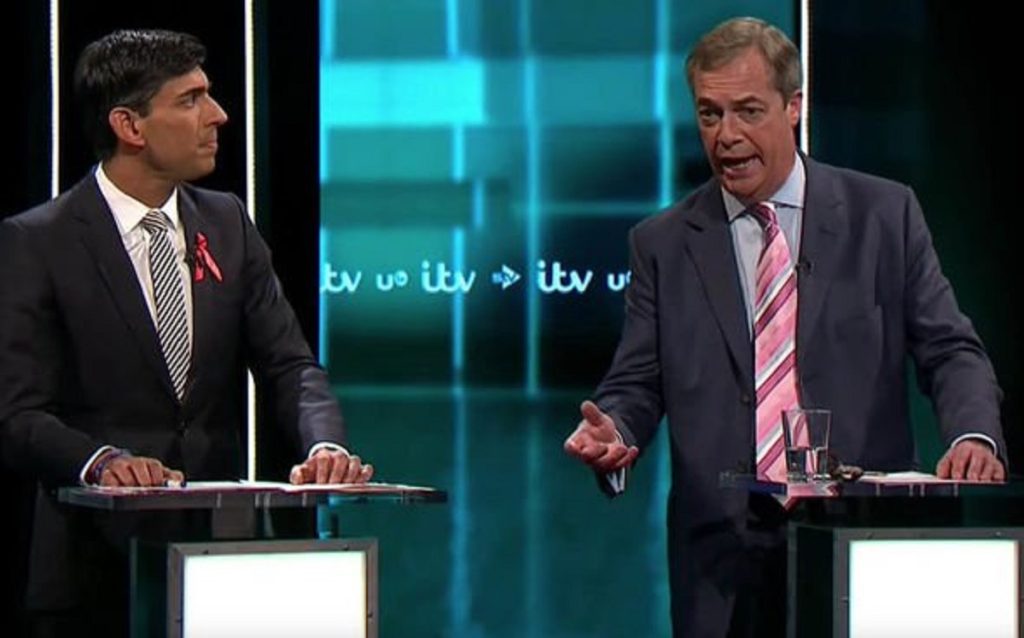
UK Conservative Party. How it failed in the election campaign
By mid-June, the electoral battle ahead of the House of Commons elections was escalating. Alternative for Britain, Nigel Farage’s Reform UK Party presented its election manifesto. In fact, the nationalists proposed a return to normality, but by today’s standards it looked like real radicalism.
Farage wanted to: freeze immigration to the UK, ban benefits for illegal immigrants, abandon the green agenda, increase oil production and build more nuclear power plants. At the same time, he wanted to cut bureaucracy in London and halve all foreign tranches to other countries, primarily Ukraine. The savings were to be spent on tax cuts, hiring 40,000 police officers to fight the soaring crime rate, and rebuilding the army. The imposition of a racial-gender agenda in schools was to be banned. He wanted to bring back patriotic history teaching. He also proposed reform of the NHS public health system, which has performed extremely poorly since the COVID-19 pandemic.
In the June polls, the Reform UK Party was increasingly either catching up with the Tories or even beating them. Nigel Farage was also making ambitious plans to finish off the Conservatives by absorbing them after the election, and then target the Labour Party. Although it was utopian, somehow his program of “Alternatives for Britain” would become more and more popular as the situation in the country deteriorated.

Farage’s popularity is a public response to “progressive” changes that threaten to bury the country economically, culturally and on a civilization level. Thus, the de-Christianization of the UK is well underway. For example, the Church of Scotland has put up for sale 100 of its buildings, including temples, at a throwaway price. Some of which were built 300 years ago. They are planned to be converted for commercial use. In 25 years, the number of Church of Scotland parishioners has fallen by 80% and the number of pastors has dropped by 40%. The total number of people attending services in the Anglican Church once a week has fallen 2 times in 25 years and amounted to 600 000. At this rate, in 10-15 years the Church of Scotland will cease to exist and its parishes will be given away for nothing.
The Church of England, meanwhile, is busy introducing “gender-neutral” prayers or recognizing same-sex couples. It is only exacerbating the religious crisis, with the abandonment of its own principles in favor of a race-gender agenda. At the same time, the number of mosques, of which there are around 2,500 in the UK, Hindu temples and gurdwaras is growing dramatically. Ethno-cultural diasporas, whose ranks are being swelled by millions of migrants, will define the religious landscape of England in the future. It is not surprising that the Tories, who have always relied on religious Anglicans as their base, are now politically bankrupt.
Nonetheless it is not only the Anglican Church that has resigned itself to sad circumstances and betrayed ideals for the sake of ‘survival’. Rishi Sunak’s election campaign, too, turned toward a brilliant debate about who should be considered male and female. Labour leader and five-minute Prime Minister Keir Starmer thought for a long time, but finally admitted that only men can have a penis. Moreover, the Labour electorate does not care about these “transgender” issues at all against the background of economic hardship. That’s why some voters from both the Conservatives and Labour are leaving for the “fascists” from Nigel Farage’s Reform UK Party. By then almost half of the Conservatives would want to unite with the Reform UK Party. Farage’s chances of leading what was left of the Tories in the next 5-7 years and the idea creating a joint project without Sunak, Johnson and other liberal traitors was rapidly increasing.

Photo by Daily Express
Two weeks before polling day, Rishi Sunak was in desperate straits because the Conservatives were already running out of funds. That’s why the remaining resources, money and volunteers, were being thrown to the rescue of “party heavyweights” including Sunak himself, Chancellor of the Exchequer Jeremy Hunt and Home Secretary James Cleverly. Electoral models at the time even predicted that the hapless Rishi might lose in his own constituency. For the first time in British history, a sitting prime minister was at risk of failing in a House of Commons election so he had to throw everything he had at avoiding such an embarrassment.
At the same time, Sunak’s own bizarre political statements were finally killing the Tories’ ratings. By the end of the election campaign, he proposed to deprive young Britons who refuse to participate in his program of returning conscription of young people of their driver’s licenses and bank accounts. The minimum level of support for the Conservatives among young people dropped to near zero because of this. And rightly so, the Conservatives were now facing the logical outcome of a total defeat in the parliamentary elections and the collapse of a party with two centuries of history.
At the same time, Nigel Farage has constantly stumped his opponents. After an interview in which he accused NATO and the EU of provoking the war in Ukraine, he was criticized by the entire political establishment. Farage was labeled the “new Chamberlain,” ready to capitulate to Russia but this hysteria has only added points to Farage, because he is the only one questioning the tired consensus. Especially against the background of the fact that only 3% of Britons still believe in Ukraine’s victory, so there shall be no need to continue fighting and Britain’s participation as a sponsor should be revised.

The British establishment was shocked when Nigel Farage’s ratings did not fall after his allegations against NATO. In his Clacton constituency in the East of England, Farage’s level of support was then approaching 50%, and it was certain that he would win it. But more importantly, if the Reform UK Party managed to beat the Conservatives in the popular vote, it could win many constituencies at once, literally taking them away from the Tories. Farage held a campaign event on the shores of the English Channel, where boats of illegals are landing. Their numbers have exceeded 50,000 during Rishi Sunak’s premiership alone, and the total number of migrants entering the UK for 2023 reaches 700,000.
Every year the UK is adding a new Liverpool in population from Pakistanis, Afghans and Arabs, and they account for 90% of all population growth. Farage calls it an “invasion” of migrant gangs from disadvantaged countries, and for him, as well as for a significant part of the electorate, this is the No. 1 problem, against which the problems of the Ukrainian war and the “green transition”, so close to the liberal establishment, pale into insignificance. Toward the end of the campaign, Farage stated the death of Thatcherism, as well as capitalism in general, in modern Britain. It has been replaced by a fusion of monopoly corporations and the state, and Farage intends to fight it in the next few years. It is unlikely that he will be able to defeat the system built by the liberal elites at first blush, but the failure of the systemic conservatives, whose niche he is able to occupy, does not play in his favor.
Five days before the UK election, the election campaign was swept by an epidemic of wiretaps, the disclosure of which hit the image of competitors. Labour was the first to be hit. They were caught admitting that the party’s carbon neutrality plan would cost hundreds of billions of pounds. One can imagine the scale of the energy crisis that will await the UK, not to mention the fact that the country, which already has a budget deficit of 120 billion pounds, could simply go bankrupt. And Labour is starting to push the green agenda at the very moment it is in crisis around the world. The right even moderate and liberal ones, in Europe are abandoning plans to achieve carbon neutrality and the same is true of Trump in the US. Against this backdrop, Labour’s ratings have fallen and in the last polls before the election it was no longer uncommon for them to have less than 40%.

Nigel Farage’s stigmatization campaign gained momentum. BBC reporters secretly filmed the actor, allegedly a supporter of the Reform UK Party, calling for migrants to be shot. Farage called it a provocation by liberal journalists, who in the end hired the actor. The Reform UK Party’s ratings in the polls were already often above 20%, and with this result they hoped to win dozens of seats in the House of Commons. And the liberal media’s hysteria about Farage and his anti-migrant and isolationist views rather added to his popularity.
On the very eve of the election, Britain was hit by “postal hysteria”. The poor performance of the Royal Mail could have resulted in tens of thousands of ballots simply not reaching polling stations on election day. This could have seriously affected the outcome of the election. In many constituencies, the gap for candidates could have been small, and would have been measured in hundreds of votes. Even the Conservatives’ traditional constituencies in the South of England could lose to the Liberal Democrats or Nigel Farage’s Reform UK Party. So the Tories planned to contest the election results at the last minute in the hope that at least they could save their seats through postal voting. However, the Royal Mail stopped working properly because of the Conservatives. Today, its operations are plagued by constant scandals due to failures in its electronic system, with letters and parcels constantly being lost. Royal Mail is also on the verge of bankruptcy and was recently sold at a very low price to a Czech investor.
Rishi Sunak, at the last moment before the election, began artistically scaring the public with the horrors of a future Labour government, pointing out that they would grant amnesty to millions of illegal migrants, lower the voting age to 16, and strangle the economy with taxes and a green agenda.
Much of this may turn out to be true, but it was hard to take such prophecies seriously from the lips of the Tories, who brought Britain to crisis with almost identical policies during their 14 years in power. By the next election, the situation in the country will definitely become even worse, which will lead to the collapse of the Labour Party. But the beneficiaries of this will definitely not be the Tories who have failed, but non-systemic forces like Farage on the right flank or Corbyn and other communists on the left. In the meantime, the country was approaching the voting day of July 4, where the Conservatives were already facing an actual failure, expressed in percentages and votes.

